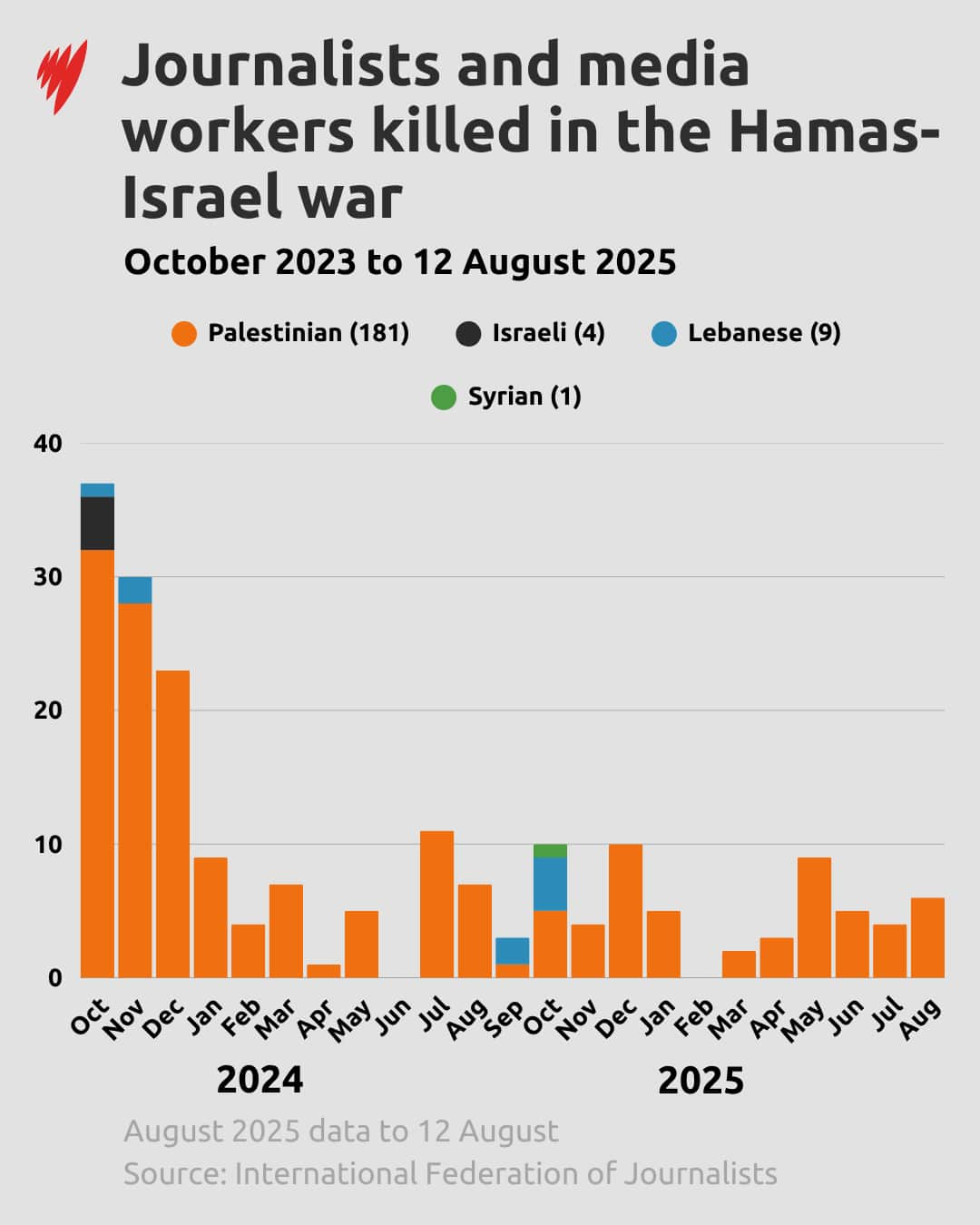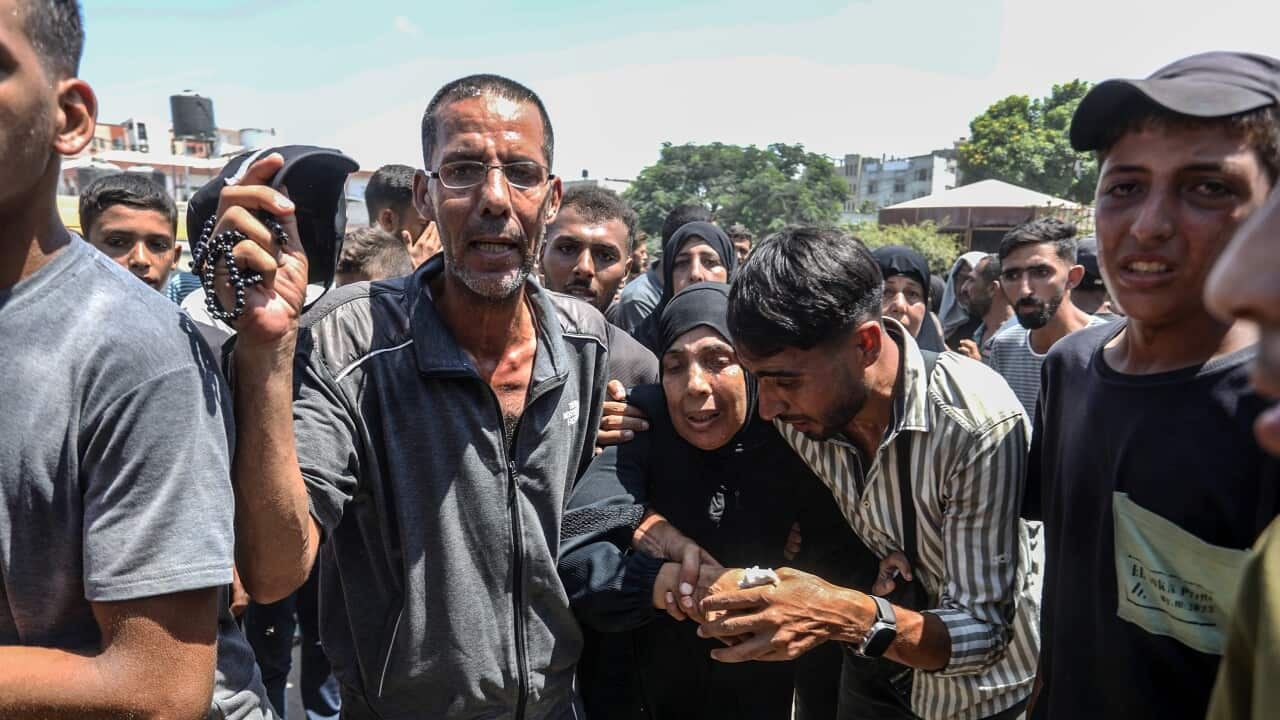Gaza's civil defence agency said five journalists were among at least 20 people killed on Monday when Israeli strikes hit a hospital in the south, with Israeli Prime Minister Benjamin Netanyahu expressing regret over the "tragic mishap".
Reuters news agency, the Associated Press and Al Jazeera all issued statements mourning their slain contributors, while the Israeli military said it would investigate the incident.
Civil defence spokesman Mahmud Bassal said "the toll so far is 20 martyrs, including five journalists and one member of the civil defence", after strikes hit Khan Yunis's Nasser Hospital — a large medical complex that has been targeted several times by Israel since the start of the war.

In a statement, the Israeli military said its troops had "carried out a strike in the area of Nasser Hospital".
"The Chief of the General Staff instructed to conduct an initial inquiry as soon as possible," it said, adding it "regrets any harm to uninvolved individuals and does not target journalists as such".
Bassal said an Israeli explosive drone hit a building at the hospital, followed by an air strike as the wounded were being evacuated.
Netanyahu said in a statement on Monday evening that his country "deeply regrets the tragic mishap that occurred today at the Nasser Hospital".
"Israel values the work of journalists, medical staff, and all civilians," he added.
Who were the journalists killed in the Nasser Hospital attack?
The Palestinian Journalists Syndicate said a group of reporters had "been martyred in the line of journalistic duty, as a result of the Israeli bombing that targeted them at Nasser Hospital".
Reuters reported that video journalist Hussam al-Masri — a contractor who was working for the agency — was operating a live feed at the hospital, "which suddenly shut down at the moment of the initial strike".
A Reuters spokesperson said in a statement the agency was "devastated" to learn of Masri's death "and injuries to another of our contractors, Hatem Khaled" in the strikes.
"We are urgently seeking more information and have asked authorities in Gaza and Israel to help us get urgent medical assistance for Hatem" the statement added.
A spokesperson for Qatar-based TV network Al Jazeera said one of its photojournalists and cameramen, Mohammad Salama, was also killed in the attack.
"Al Jazeera Media Network condemns, in the strongest possible terms, this horrific crime committed by the Israeli occupation forces, who have directly targeted and assassinated journalists as part of a systematic campaign to silence the truth," the broadcaster said in a statement.
The Associated Press said in a statement that it was "shocked and saddened" to learn of the death of Mariam Dagga, 33, who had freelanced for the agency since the start of the war.
The Palestinian Journalists Syndicate named two other victims as Moaz Abu Taha and Ahmad Abu Aziz.
Later on Monday, a sixth journalist, Hassan Douhan, was killed by Israeli fire in the Al-Mawasi area of Khan Yunis, according to the Palestinian Journalists Syndicate and Nasser Hospital.
Double strike: How the attack unfolded
Medical staff at Nasser hospital said the first strike hit around 10am local time.
Agence France-Presse footage from the immediate aftermath of the attack showed smoke filling the air and debris from the blast on the floor outside the hospital.
Approximately 10 minutes later there was another blast in the same spot, according to a British medical professional working in the hospital.
The World Health Organization said the hospital's emergency department, inpatient ward, and surgical unit was hit.
A livestream by Al Ghad TV shows a strike directly hitting emergency workers responding to the first strike, and journalists filming what's happening. At least one body is visible in the aftermath.
Nasser Hospital is one of the last remaining health facilities in the Gaza Strip that is at least partially functioning.
Later in the day, a crowd carried the bodies of some of the killed journalists at a funeral in Khan Younis, with the dead wrapped in white burial shrouds and their press flak jackets resting on top.
"We will not stop walking this path, and the coverage will continue, God willing," said Masri's brother Mahmoud.
'Outraged and in shock'
On Tuesday morning, Environment Minister Murray Watt described the hospital strikes as a breach of international law and an outrage.
"It's very clear that targeting or hitting hospitals, health workers and civilians is a breach of international law," he told the ABC.
"We join with the rest of the international community in condemning this action.
"This is not the first time we’ve seen (Benjamin) Netanyahu apologise or accept when he calls innocent mistakes or mishaps. Every time something like this happens, it costs people's lives. It's not acceptable," he said.
The ongoing war in Gaza has been one of the deadliest for journalists, with around 200 media workers killed over the course of the nearly two-year Israeli assault, according to media advocacy groups the Committee to Protect Journalists (CPJ) and Reporters Without Borders.
Earlier this month, four Al Jazeera staff and two freelancers were killed in an Israeli air strike outside Al-Shifa hospital in Gaza City, prompting widespread condemnation.
The Foreign Press Association said it was "outraged and in shock" at the killing of journalists in the Nasser hospital strike.
"We demand an immediate explanation from the Israel Defense Forces and the Israeli Prime Minister's Office. We call on Israel once and for all to halt its abhorrent practice of targeting journalists."
Israel has bombarded Gaza since Hamas' October 7 attack in which more than 1,200 people, including an estimated 30 children, were killed and over 200 hostages taken, according to the Israeli government.
More than 62,744 people have been killed in Gaza since October 7, according to the health ministry in Gaza.
The October 7 attack was a significant escalation in the long-standing conflict between Israel and Hamas.
For the latest from SBS News, download our app and subscribe to our newsletter.

